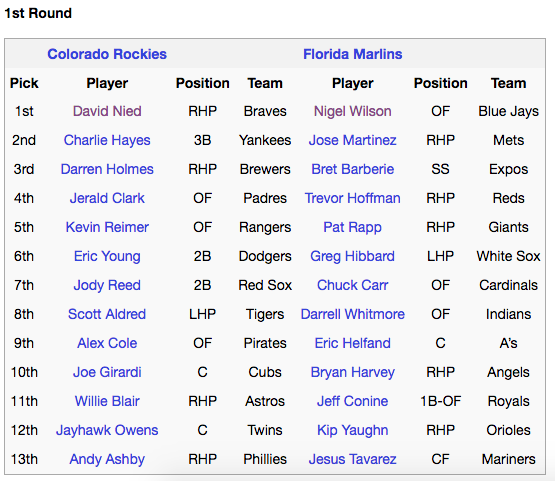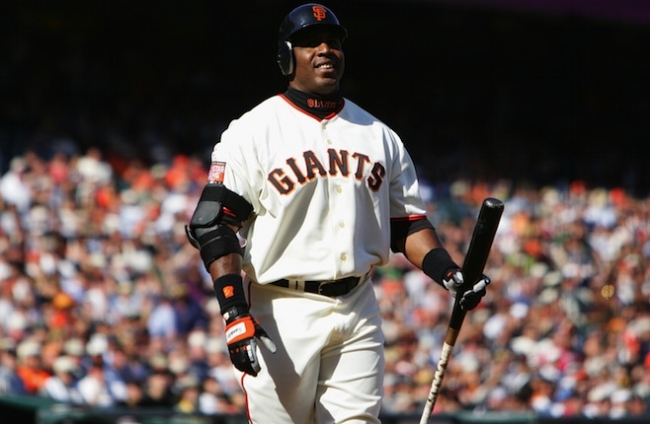The internet tells me there was an NHL expansion draft earlier this week. I'm not much of a hockey guy, but I do love expansion teams. The Vegas Knights are off to a rough start, though.
I thought it would be a good time to revisit the two most recent MLB expansion drafts. Today will be the 1992 draft and Saturday will be 1997. First, let's look at overall expansion drafts by decade. The NHL expansion draft was the first since the NBA in 2004.
Four Major US Sports Expansion Drafts
Colorado and Florida were accepted as expansion teams for the 1993 season. They were selected as NL cities after the players and owners agreed to expand in the 1985 CBA. Other than Denver and Miami, there were four other cities that drew serious consideration: Buffalo, Orlando, Tampa, and Washington, D.C. Still waiting on Buffalo and Orlando...
The 1992 expansion draft—held in November after the season—was the first baseball draft where both leagues had to make their players available to new teams. Previously, a new National League team could only pull players from other NL teams. Each of the 26 existing teams could protect 15 players from their 40-man roster. Players drafted in 1991 and 1992 were not eligible. Either were free agents, but the Rockies and Marlins were free to sign any free agent they wanted. The Rockies first signing was 32-year-old slugger Andres Galarraga. The Marlins signed 45-year-old Charlie Hough to be their opening day starter (Hough was the last active player to be born in the 40s.)
The first two picks were players you have never heard of, pitcher David Nied and outfielder Nigel Wilson. Nied was ranked the number 23 prospect before the 1993 season by Baseball America and Wilson was number 37. Both were up in the majors by the end of their team's first season, but performed horribly. Nied compiled a 5.17 ERA in 16 starts for the Rockies and Wilson went 0-for-16 with 11 strikeouts for the Marlins.
The Marlins packaged their second pick, Jose Martinez, and fourth pick, Trevor Hoffman, in a mid-season deal to the Padres for Gary Sheffield. Hayes would smack 25 home runs and 45 doubles at Mile High Stadium in 1993 (Coors opened in 1995), but is probably best known for catching the last out in the 1996 World Series. Kevin Reimer was traded immediately after the draft to the Brewers for Dante Bichette.
Including Hoffman, there were six eventual All-Stars out of the 26 players taken: Eric Young (Rockies), Joe Girardi (Rockies), Bryan Harvey (Marlins), Jeff Conine (Marlins), and Andy Ashby (Rockies). Chuck Carr never made an All-Star team, but has a great Wikipedia page.
Can you name the three future All-Stars in the second round? How about Carl Everett (Marlins), Vinny Castilla (Rockies), and Jack Armstrong (Marlins). Kevin Ritz is 7th all-time on the Rockies wins list with 39 (5.20 ERA). Wedge is one of three players taken that went on to be managers (Girardi and Brad Ausmus).
The third round was mostly terrible, outside of Ausmus and Danny Jackson, both All-Stars later in their career (Jackson had already been one, as well). Steve Reed turned into a decent reliever. Armando Reynoso was the Rockies best starting pitcher in 1993 as a rookie, throwing 189 innings with just a 4.00 ERA—a very impressive feat in Colorado.
So, did the Marlins or Rockies win the draft? You'd have to say Florida because they won a World Series. However, the Rockies were surprisingly competitive for most of the 90s.
| Rockies | ||
|---|---|---|
| Year | W-L | Run Diff |
| 1993 | 67-95 | -1.3 |
| 1994 | 53-64 | -0.6 |
| 1995 | 77-67* | 0.0 |
| 1996 | 83-79 | 0.0 |
| 1997 | 83-79 | 0.1 |
| 1998 | 77-85 | -0.2 |
| 1999 | 72-90 | -0.8 |
| 2000 | 82-80 | 0.4 |
* Made the playoffs
| Marlins | ||
|---|---|---|
| Year | W-L | Run Diff |
| 1993 | 64-98 | -0.9 |
| 1994 | 51-64 | -0.9 |
| 1995 | 67-76 | 0.0 |
| 1996 | 80-82 | -0.1 |
| 1997 | 92-70* | 0.4 |
| 1998 | 54-108 | -1.6 |
| 1999 | 64-98 | -1.0 |
| 2000 | 79-82 | -0.4 |
Overall, the Rockies went 594-639 (.481%) versus the Marlins 551-678 (.448%). Would you rather be competitive every year or win a World Series once?











Baseball is here! And more importantly, that means the over/under game is back. It seems as though everyone is an expert this time of year. Somehow we convince ourselves that we are better at predicting baseball outcomes than everyone else. Well, AFITB is putting that to the test for the third year in a row. Think you know more about baseball than us? You probably do. But go ahead and prove it anyway.